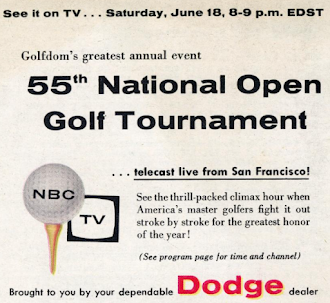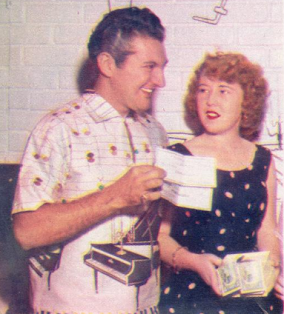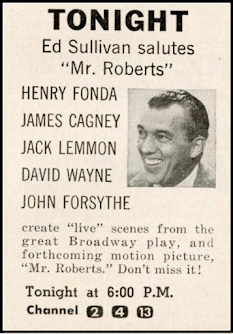I don't often lead with a sports item, but sometimes relevant news is hard to come by in these issues from the mid-1950s, and in this case we've got a truly notable event in store: the 1955 U.S. Open golf championship. (Saturday, 6:00 p.m. CT, NBC) If that doesn't sound like a reason to get worked up, just wait for the story behind the headline—or the listing, as it was.
Ben Hogan was already a legend in 1955. A movie had been made about his life, starring Glenn Ford; he owned a successful company that manufactured top-level Hogan golf clubs; he wrote a best-selling golf instruction manual that is still considered a classic today; he received a ticker-tape parade in New York after winning the British Open in 1953; and he had earned the admiration of everyone after successfully coming back from a catastrophic auto accident in 1949 that had nearly killed him. Coming into the 1955 Open, he was seeking to become the first man to win five U.S. Open championships. Sports Illustrated's Open preview was entitled, "The Age of Hogan."
As Hogan accepts congratulations from his fellow competitors in the clubhouse, word comes back that there is only one player remaining with a mathematical chance of catching Hogan: a municipal club pro from Iowa named Jack Fleck, playing about an hour behind Hogan, who needs to birdie two of the final four holes just to tie, on one of the toughest courses to host the Open. A sportswriter comes with the news that Fleck had birdied 15 to pull within one. Pars follow on 16 and 17, and then a report that Fleck's second shot on 18 has rolled to within eight feet of the hole. The room is silent; Hogan, noncommittal as always, remains seated in front of his locker. The clubhouse then echoes with a thunderous roar from the 18th green; Fleck has indeed made the putt to finish with a magnificent 67 and tie Hogan, forcing an 18-hole playoff the following day. On that Sunday, with everyone waiting for Fleck to make a mistake, he shoots a one-under-par 69 to defeat Hogan by three shots in one of the greatest upsets in Open history.
Joe McCarthy might have asked the question this way: Are you now or have you ever belonged to a fan club? Maybe you belong to one now, or at least an online group. I think the only one I ever joined was the Doctor Who Fan Club, which I was part of for a few years back in the 1980s. This week, Robert E. Johnson goes behind the scenes of those fan clubs devoted to television stars, including one of the first, devoted to Liberace. His fan club predates television, having been started by a Chicago switchboard operator named Kitty Pastore in 1947, but thanks to the power of TV, there are now "300 Liberace and brother George Liberace fan clubs in the United States and Canada—two of them with more than 3000 members each."
Which brings us to the historic Olympic Club in San Francisco, where, as the famed golf writer Herbert Warren Wind says, the fog rolls in on little caddies' feet. In these days, the highlight is "Open Saturday," a 36-hole finale—18 holes in the morning, 18 in the afternoon. With no opportunity to reorder the players after the third round, the leaders are not necessarily the last players on the course. Nevertheless, as Hogan finishes the tournament with an even-par 70, it looks as if his fifth title is in the (golf) bag. His old rival, Sam Snead, is let down by his putter and finishes five strokes behind, along with contender Tommy Bolt. Announcer Gene Sarazan, himself a former two-time champion providing commentary on NBC (it's only the third-ever national golf telecast!), congratulates Hogan on the win, and asks him to hold up five fingers to signify five Open titles. NBC, with only an hour of coverage scheduled, signs off, declaring Hogan the probable winner.
 |
| See most of it on TV, anyway |
Of course, none of this was yet known by viewers tuning in to that final round on Saturday, and they wouldn't see that fantastic finish on 18 anyway. (Nor will they see the playoff on Sunday, NBC having previously declined its option to cover it. They would have only shown the final two holes anyway.) But even if you'd somehow been able to tell them how things would turn out, they wouldn't have believed it.
l l l
People hanging around for an extra night in San Francisco because of the Open playoff might be making things difficult for hoteliers in the Bay Area, many of whom are expecting extra business this week. That's because the United Nations is in town, commemorating its 10th anniversary in the city that hosted the UN's first meeting in 1945, and there's plenty of TV coverage of this last, best hope for peace. (Which makes its abject failure all the more poignant, seeing as how so much faith is being put into it.) It features on the Sunday afternoon public affairs program Comment with newscaster Richard Harkness (2:00 p.m., NBC), and is the single topic on American Week with Eric Sevareid (3:00 p.m., CBS). As well, Henry Cabot Lodge, U.S. ambassador to the U.N., is the guest in San Francisco on Meet the Press (4:00 p.m., NBC).
On Monday, Dave Garroway takes Today to San Francisco via remote to interview international delegates. (7:00 a.m., NBC). Meanwhile, the Camel News Caravan (5:45 p.m, NBC), with anchorman John Cameron Swayze, broadcasts the entire week from The City, with film and live coverage from the session. Most ambitious, perhaps, is NBC's Tuesday through Friday schedule, carrying a half-hour address each day from the foreign minister of one of the Big Four nations (the United States, Great Britain, France, and the Soviet Union). It's a type of daytime television on a commercial network that would be unthinkable today.
l l l
Opposite NBC's U.S. Open coverage, incomplete as it is, Jackie Gleason says farewell for the season on CBS (Saturday, 6:00 p.m.) with a show so big, it takes up almost the entire column. In a concept that seems ripped right from The Dick Van Dyke Show, Gleason emcees a variety show that includes the entire cast, including production personnel. Examples: Six of the June Taylor dancers are joined by a sextet consisting of writer Marvin Marx, associate producer Stanley Poss, conductor Ray Bloch, Gleason's personal manager George Durgom, director Frank Satenstein, and announcer Jack Lescoulie; in another bit, announcers Jimmy Blaine and Bill Nimmo are joined by producers Jack Philbin and Jack Hurdle in a barbershop quartet. The pros are at work too, with performances by Art Carney, Audrey Meadows, and June Taylor.
Speaking of spectaculars though, Gleason is matched by Ed Sullivan, whose Toast of the Town show (Sunday, 6:00 p.m., CBS) devotes the entire hour to the stage play and movie Mister Roberts, celebrating its seventh anniversary on Broadway (and soon to be a major motion picture). The star-studded lineup, recreating scenes from the stage and screen versions, includes the original Roberts, Henry Fonda; the stage and movie versions of Ensign Pulver, David Wayne and Jack Lemmon; and the movie's Captain Morgan, James Cagney. Stage producer Leland Hayward and movie producer-director Mervyn LeRoy are on hand as well. We don't have a rival variety show to compare to Ed this week, but with that list of stars, it wouldn't have mattered.
John Henry Faulk, soon to be embroiled in the blacklist controversy, is the substitute host for Jack Paar's weekly morning show (M-F, 7:00 a.m., CBS). As for primetime, it's the last show of the season for Sid Caesar (Monday, 6:00 p.m., NBC), and, as with Jackie Gleason, the whole gang's on hand—Nanette Fabray, Carl Reiner, Howard Morris, Virginia Curtis, and Ellen Parker. Bill Hayes, who's part of the upcoming summer replacement series, is tonight's special guest.
Tuesday night features the Roy Rogers World Championship Rodeo from San Antonio, Texas (6:00 p.m., NBC), and in addition to Roy, Dale Evans, Pat Brady, and the Sons of the Pioneers, we've got bronc riding, calf-roping, saddle bronc riding, steer bulldogging, and wild bull riding. All interspersed with entertainment from the stars, of course. Opposite that, Disneyland looks not to the past, but the future, as Tomorrowland presents "Man in Space." (6:00 p.m., ABC). Here it is; this series of space films helped make Dr. Wernher von Braun a household name and American hero. I've always enjoyed rodeos, but I'm pretty sure I'd have watched this instead.
Wednesday features the other big sports event of the week, the light-heavyweight championship fight between the champion, Archie Moore, and the challenger, middleweight champion Bobo Olson (8:00 p.m., ABC). Moore, the ageless Mongoose, knocks Bobo out in the third round; later in the year, Moore steps up in class to fight Rocky Marciano for Rocky's heavyweight crown. Since Marciano is the only heavyweight champion to retire with a perfect record, we don't need to guess how that one turns out.
We all know that Rod Serling was a prolific writer for television long before The Twilight Zone, and on Thursday's episode of Climax (6:30 p.m., CBS), Wendell Corey, Akim Tamiroff, and Maria Riva star in Serling's "To Wake at Midnight," with a typically provocative storyline: "All the pent-up prejudices and hatreds of postwar Europe are revived when a Nazi lieutenant recovers consciousness in a British hospital after being in a coma for years."
There were, I think, four great police series of the 1950s that incorporated their setting as a virtual character in the program: Dragnet (Los Angeles), M Squad (Chicago), Naked City (New York), and The Lineup (San Francisco). And it is the last that we look at on Friday (8:00 p.m., CBS), in the last show of the season. It's not particularly different from the other three; it's not quite as—documentarian?—as Dragnet, but it's a serviceable, enjoyable series that runs for six seasons, three of them in the top 20, and has a likeable cast in Warner Anderson and Tom Tully. Like their L.A. counterparts, The Lineup became a pretty good big-screen movie in 1958, although, unlike Dragnet, in black-and-white.
l l l
In case you thought celebrities getting in trouble for giving political opinions on television is a fairly recent development, the Broadway columnist Earl Wilson, who also happens to have a weekly column in TV Guide, is about to set you straight: "When Sen. John McClelland was a mystery guest on What's My Line?, the panelists discovered he was a Democrat. 'So you're not Joe McCarthy?' said Fred Allen. 'No,' replied the guest. "Congratulations!" shrieked Arlene Francis. McCarthy supporters sent in so many letters that emcee John Daly answered with a form reply saying Miss Francis had merely been congratulating Allen for discovering that the guest wasn't Senator McCarthy." It's always like playing with fire, isn't it?
l l l
 |
| Liberace with Ruth Forqueran, whose club numbers 3,000 members |
One of the largest belongs to cowboy hero Roy Rogers, who mails as many as 130,000 copies of his eight-page tabloid newspaper to members of his fan club every two months. But clubs come in all shapes and sizes; Irene Jackson, a widow with a 12-year-old son, is the president of Hugh O'Brian's fan club, and a member of 20 other clubs. There are even clubs comprised of presidents of fan clubs; two of which are the International Fan Club League and the International Association of Fan Clubs.
According to Johnson, the average fan club member pays a buck and a half a year, in return for which the member gest a membership card, an 8x10 autographed photo, notices of special club activities, and perhaps three newsletters a year. Many clubs raise money for charities, such as retarded children, an interest of Dale Evans. The dues from the Liberace Club of Lakewood, California go to Lee's favorite charities.
Not every star is thrilled by fan clubs, though, and there are risks. As top Hollywood publicist Charlie Pomerantz points out, fan clubs "are the world's best form of publicity if you can control it. Word-of-mouth publicity is the most powerful form of publicity, but also the most dangerous if it gets out of hand", hence the newsletter that comes directly from the Roy Rogers organization. Meanwhile, other stars allow only one official club, and limit their membership (Desilu has only 150 members). But everyone agrees that for the club organizers, there's no profit; it's just a labor of love. TV







No comments
Post a Comment
Thanks for writing! Drive safely!